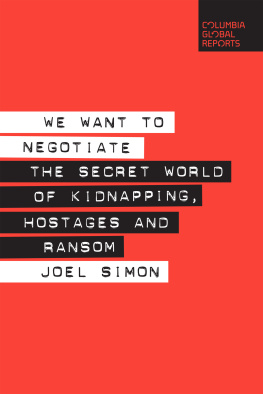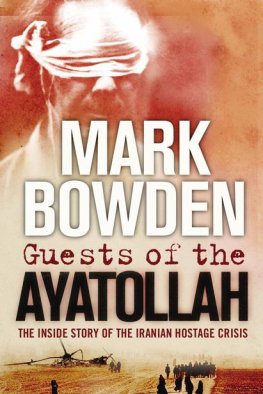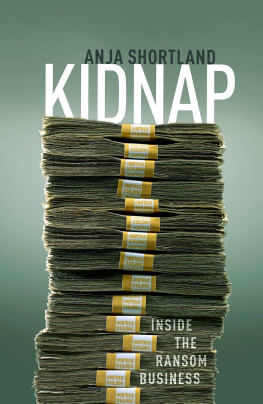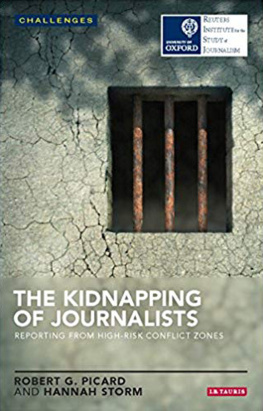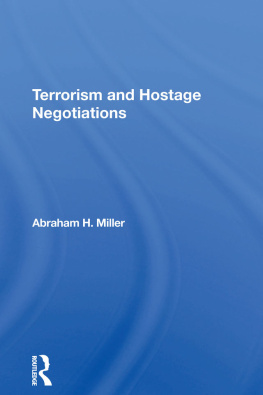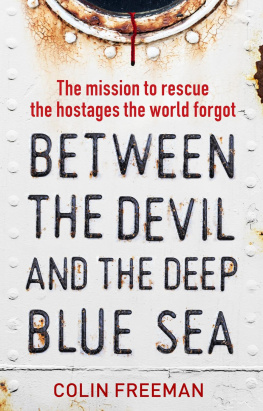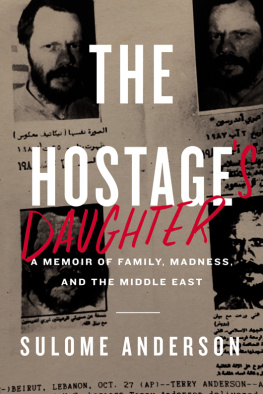
Advance Praise for Joel Simons We Want To Negotiate
A wise and thorough investigation of the painful conundrum posed by terrorist kidnappings. Simon makes a cogent argument about how to change our current, failed approach to negotiation.
Lawrence Wright,
author of The Looming Tower and The Terror Years
In We Want to Negotiate, Joel Simon combines the breadth of his knowledge alongside stunning narratives to try to understand how the gruesome and murky trade of kidnapping really works. Simons international policy expertise and his compassion for his subjectsmany of whom he knew and worked alongsideshine through to create a spellbinding, chilling, and important read.
Janine di Giovanni,
Senior Fellow, the Jackson Institute of Global Affairs, Yale University, and author of The Morning They Came for Us: Dispatches from Syria
A persuasive argument that deserves to be heard in Foggy Bottom, the Pentagon, and other corridors of power.
Kirkus Reviews
This is an excellently researched and reasoned book on a terrible and complicated problem: what to do when someone is taken hostage. I hope all those who have had to face this awful dilemma will read it, and especially those who make and carry out government policy.
Terry Anderson,
author of Den of Lions, hostage in Lebanon for seven years
Joel Simon has written an invaluable insiders account of the how and the why of the shadowy business of ransom negotiation at the highest level. For anyone who has ever wondered why some governments negotiate for the release of their captured citizens, while othersincluding our owndo not, Simons book is essential reading. As head of the Committee to Protect Journalists, Simon has seen the hostage crisis up close and this book reflects his intelligence, courage, and clear-eyed approach to this murky but, sadly, thriving business.
Kati Marton,
author of Wallenberg, Hidden Power, and The Great Escape
Joel Simons book about the dark world of kidnappers and their hostages is deeply reported, well written, and well calibrated in its judgments. For anyone who wants to understand the many difficult questions raised by the kidnapping trade, Simons book will be the standard.
Peter Bergen,
author of United States of Jihad: Who are Americas Homegrown Terrorists and How Do We Stop Them
We Want To Negotiate
The Secret World of Kidnapping, Hostages, and Ransom
COLUMBIA GLOBAL REPORTS
NEW YORK
We Want To Negotiate
The Secret World Of Kidnapping, Hostages, And Ransom
Copyright 2019 by Joel Simon
All rights reserved
Published by Columbia Global Reports
91 Claremont Avenue, Suite 515
New York, NY 10027
globalreports.columbia.edu
facebook.com/columbiaglobalreports
@columbiaGR
Library of Congress Control Number: 2018949787
ISBN: 9780999745427
E-book ISBN: 9780999745434
Book design by Strick&Williams
Map design by Jeffrey L. Ward
Author photograph by Rebecca Greenfield
Printed in the United States of America
We Want To Negotiate
The Secret World of Kidnapping, Hostages, and Ransom
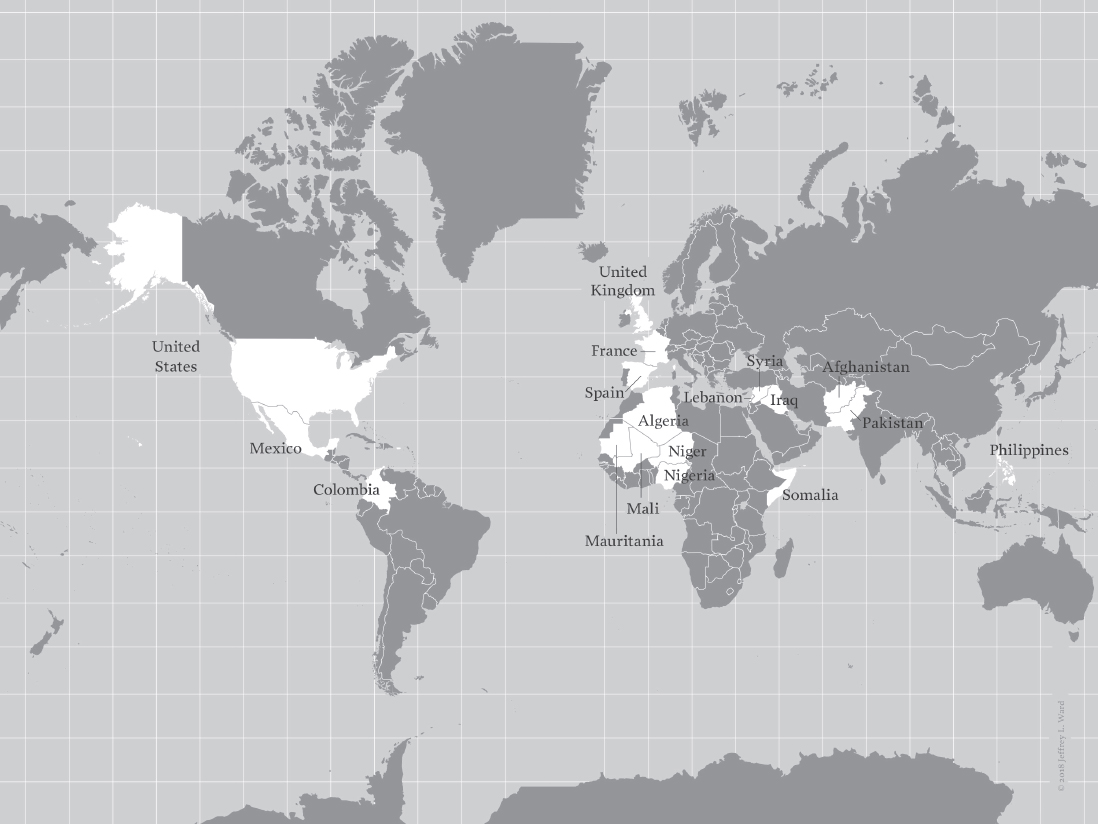
CONTENTS
Introduction
During the nearly two decades that I have worked at the Committee to Protect Journalists, my job has been to defend the rights of the journalists around the world. Kidnapping and illegal detentions are among the most common threats. Ive worked on dozens of such cases, many involving international journalists.
In late 2002, Wall Street Journal reporter Daniel Pearl was kidnapped in Karachi, Pakistan, by Al Qaeda. In 2003, Los Angeles Times photographer Scott Dalton, along with a British colleague Ruth Morris, was kidnapped in Colombia by FARC guerrillas. In 2006, Jill Carroll, a reporter working for the Christian Science Monitor, was kidnapped in Iraq. In 2008, Canadian journalist Amanda Lindhout and her Australian colleague Nigel Brennan were kidnapped in Somalia. That same year, New York Times reporter David Rohde and his two Afghan colleagues disappeared while reporting in Afghanistan.
In some of these cases, publicity was deemed to be helpful. So we cranked out press releases, did media interviews, and developed strategies to put pressure on the kidnappers by building public sympathy. In other cases, the families or the media companies asked for discretion, and we honored such requests, putting out limited information or none at all. Sometimes, the journalists were freelancers who did not have a media company to stand up for them. I recall a number of instances in which I had to mediate complex family situations, involving divorced parents, exes, and concerned friends, none of whom were clear about who was supposed to make decisions.
Responding to a kidnapping puts a tremendous strain on even the best-managed media company. It is all but impossible for a family to bear. This fact hit me directly in the spring of 2014, when I got a call from David Rohde. Diane and John Foley, the parents of journalist Jim Foley, were coming to New York. They wanted to see me.
Jim Foley had disappeared in Syria in November 2012, and for a time nothing was known about his whereabouts. CPJ had learned that a number of other international journalists had gone missing in Syria around the same time. We knew something bad was up, but we were not sure what. We had been asked not to publish any details about some of the missing journalists but finally, in order to alert other journalists about the danger, we put out a press release noting the high number.
We were certainly aware of Jims case, as he was a personal friend to many at our organization. I had met him briefly at a photo exhibition in Manhattan. Since Jims kidnapping in Syria, we had been working closely with Phil Balboni, the publisher of GlobalPost, where Foley worked. We offered our help and advice, but since Balboni was working behind the scenes with a private security consultant, there wasnt much we could do other than publicly express our concern.
Now, after eighteen months with little progress, Diane and John had decided to try to raise a ransom to free Jim. They were looking to produce a video and asked for my help. Their idea was to show the video at fundraising events, or even screen it for individuals in a position to make a pledge. John and Diane asked if I could find a filmmaker who would take this on. The first several I approached turned me down flat because of the perceived legal risk. Finally, I found a young filmmaker through a contact at Columbia University who agreed to help shoot interviews. We converted the CPJ conference room into a mini-studio, and invited Jims friends and colleagues to come by and provide their testimony. We gave this footage to Diane, who eventually found another filmmaker in California to create the final four-minute video.
But the fundraising effort never really got off the ground. In August, Jim was dead. The video was shown at a memorial service held for Jim in October near his family home in Rochester, New Hampshire. Im sure I was one of the few people in the room who knew its intended purpose.
John and Diane, and all of the Foley family, showed tremendous strength and fortitude following Jims death. They spoke at the CPJ gala dinner in November 2014, during which we remembered Jim. But colleagues began telling me that in private Diane was quite critical of CPJs role. So I asked about her concerns. She told me that CPJ did not do enough for Jim, and that she was disappointed. I conceded that we could have done more, but also explained why we were constrained. At the time CPJ had a policy of discouraging the payment of ransomespecially by governmentsbecause we believed that paying ransom could lead to additional kidnappings, increasing the risk for all journalists. I also had personal concerns about the legal risks to me and to the organization if we were directly involved in any fundraising effort, since the money raised would go to a terrorist group.
Next page
